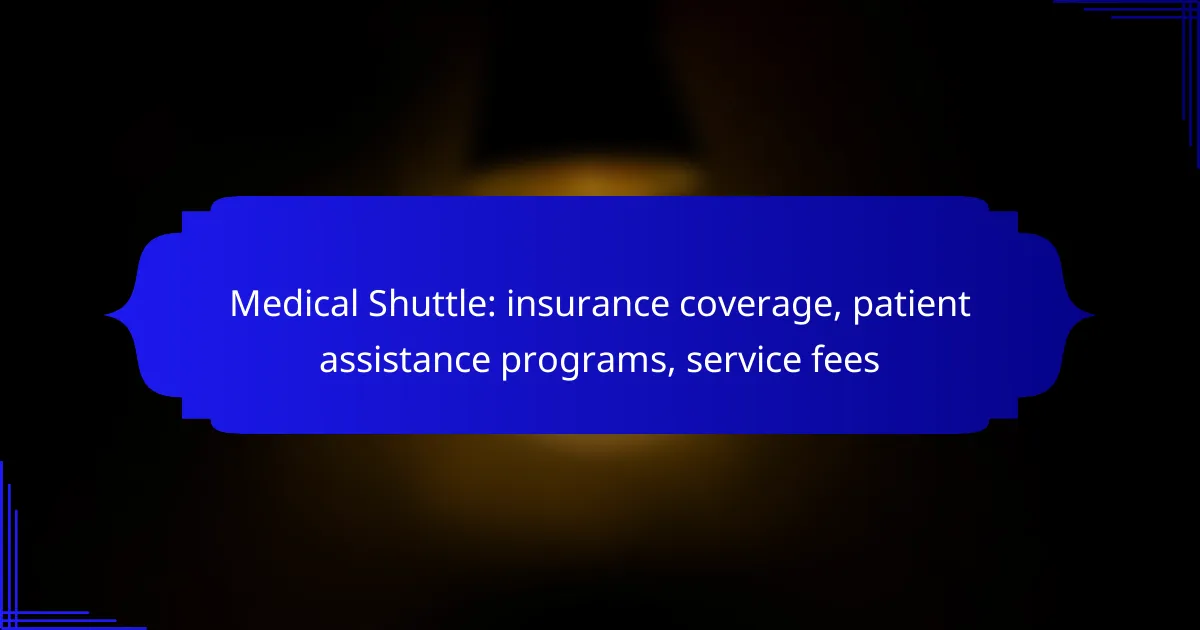Medical shuttle services in the UK provide essential transportation for patients, often covered by various insurance policies, including private health insurance and NHS provisions. Patients may also find financial assistance through local hospitals and non-profit organizations, easing the burden of transportation costs. Service fees typically range from £30 to £100 per trip, influenced by distance and service type, making it important for patients to understand their options and potential expenses.

What insurance covers medical shuttle services in the UK?
In the UK, medical shuttle services may be covered by various insurance policies, including private health insurance and provisions from the National Health Service (NHS). Coverage specifics can vary widely, so it is essential for patients to check their individual plans for details.
Medicare coverage for medical transport
In the UK, Medicare does not exist as it does in the US; however, some aspects of medical transport may be covered under specific health plans. Patients should inquire about transport services related to hospital admissions or outpatient treatments, as these may qualify for reimbursement.
Typically, eligibility for coverage will depend on the medical necessity of the transport. Patients should provide documentation from healthcare providers to support their claims for transport services.
Private insurance policies and medical shuttles
Private insurance policies in the UK often include provisions for medical shuttle services, but coverage can differ significantly between providers. Some plans may cover the full cost of transport, while others might require co-pays or have limits on the number of trips allowed per year.
It is advisable for patients to review their policy documents or contact their insurance provider directly to understand the specifics of their coverage, including any pre-authorization requirements.
National Health Service (NHS) provisions
The NHS provides certain transport services for patients who have medical needs that require specialized transport. This includes non-emergency patient transport services (NEPTS) for individuals who cannot use public transport due to their medical condition.
To access NHS transport services, patients typically need to be referred by their healthcare provider, who will assess the necessity based on medical criteria. It’s important to note that not all transport needs will be covered, so patients should clarify their eligibility with NHS representatives.
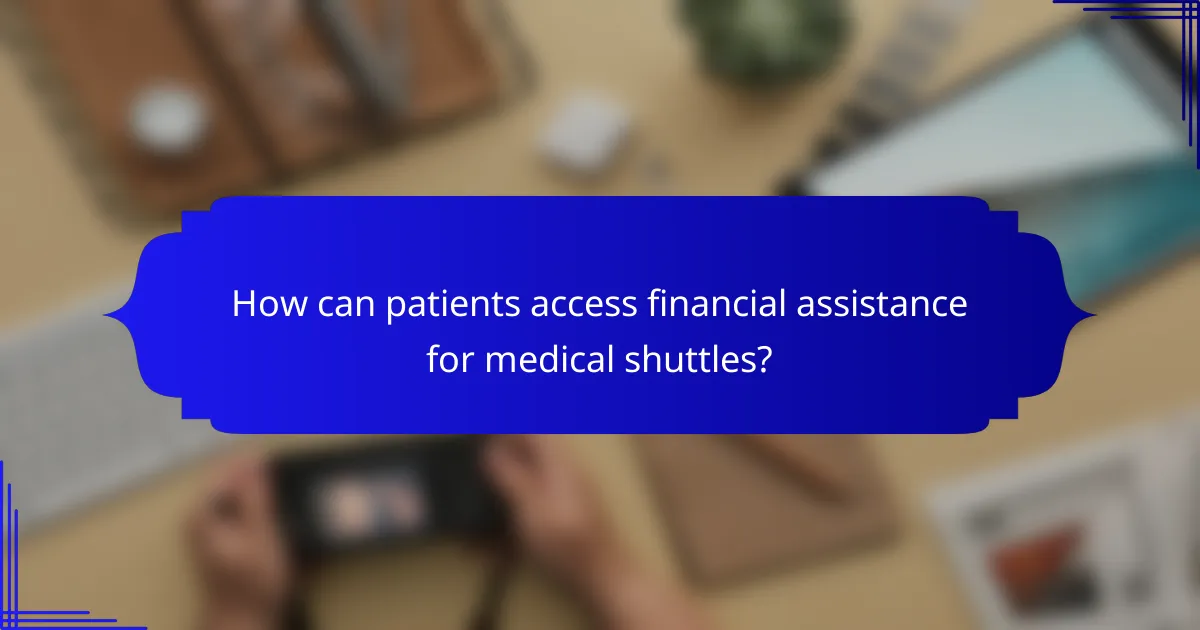
How can patients access financial assistance for medical shuttles?
Patients can access financial assistance for medical shuttles through various programs offered by local hospitals and non-profit organizations. These resources help cover transportation costs, making it easier for patients to attend medical appointments without financial strain.
Patient assistance programs by local hospitals
Many local hospitals provide patient assistance programs that include transportation services for those in need. These programs often cater to low-income patients or those with specific medical conditions requiring regular visits. To access these services, patients typically need to contact the hospital’s social services department to inquire about eligibility and application processes.
Some hospitals may offer shuttle services directly or partner with local transportation providers. It’s advisable for patients to check with their healthcare provider to see if such options are available and whether they can be covered by insurance or grants.
Non-profit organizations offering transport aid
Numerous non-profit organizations focus on providing transportation assistance to patients. These organizations often have specific criteria, such as geographic location or medical need, and may offer free or low-cost shuttle services. Examples include the American Cancer Society, which provides rides to treatment, and local charities that support patients with chronic illnesses.
Patients should research non-profits in their area and reach out to them for information on available services. Many organizations have online applications or hotlines to streamline the process of securing transportation aid. It’s important to apply early, as funding may be limited and services can fill up quickly.
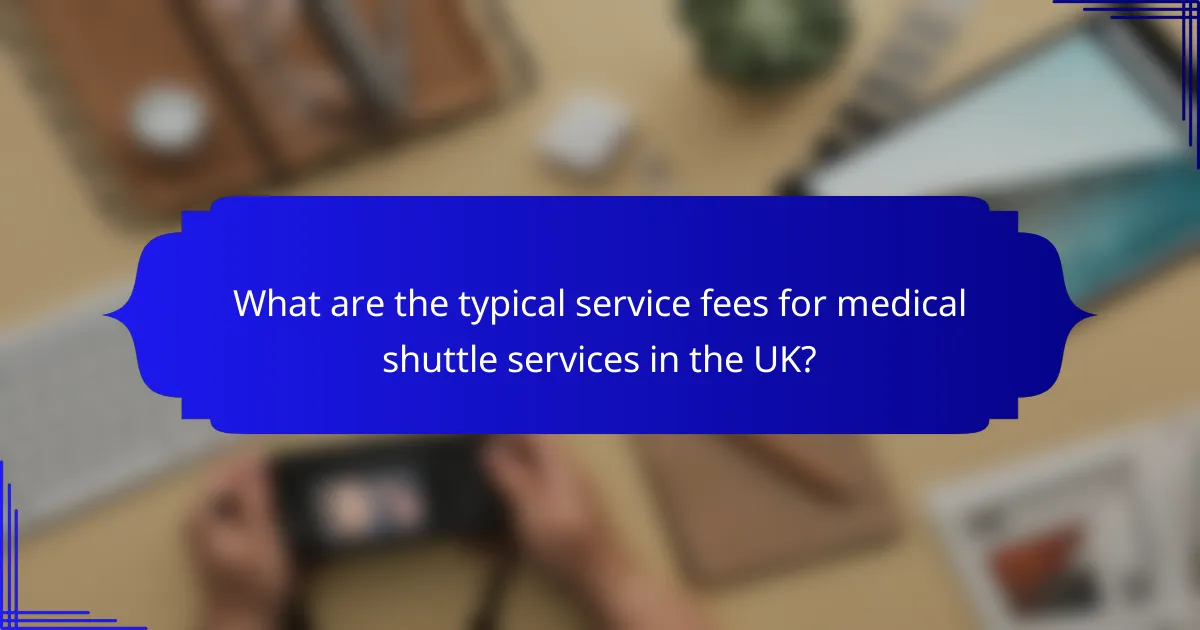
What are the typical service fees for medical shuttle services in the UK?
Medical shuttle services in the UK generally charge fees that can vary based on several factors, including distance and type of service. On average, patients can expect to pay anywhere from £30 to £100 for a single trip, depending on their specific needs and location.
Average cost of medical shuttle rides
The average cost of medical shuttle rides in the UK typically falls between £30 and £100 for a one-way trip. Shorter distances or standard services may cost less, while longer journeys or specialized services can push prices higher. Some companies offer package deals for multiple rides, which can provide savings for patients needing regular transportation.
Factors affecting shuttle service pricing
Other factors include the level of assistance required, such as wheelchair accessibility or medical supervision during the ride. Time of day and demand can also play a role, with peak hours potentially leading to increased prices. Patients should inquire about any additional fees for special requests or services when booking their rides.
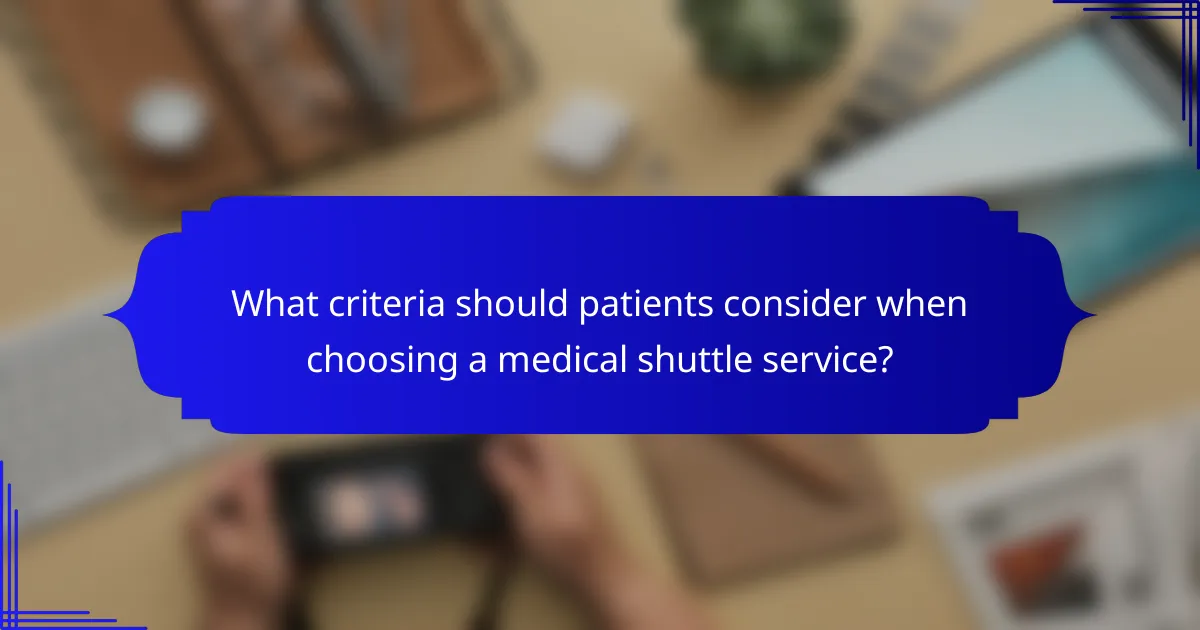
What criteria should patients consider when choosing a medical shuttle service?
Patients should evaluate several key criteria when selecting a medical shuttle service, including service availability, vehicle types, and accessibility options. These factors can significantly impact the quality of care and convenience during medical appointments.
Service availability in specific regions
When choosing a medical shuttle service, it’s crucial to confirm that the service operates in your area. Many services are limited to specific regions, so check their coverage maps or contact them directly to ensure they can accommodate your location.
Additionally, consider the frequency of service in your region. Some areas may have limited shuttle availability, which could lead to longer wait times or scheduling challenges. Look for providers that offer regular routes and flexible scheduling to meet your needs.
Types of vehicles and accessibility options
The types of vehicles used by a medical shuttle service can greatly affect your comfort and safety. Ensure that the service offers vehicles equipped for medical transport, such as those with wheelchair lifts or other accessibility features. This is particularly important for patients with mobility challenges.
Inquire about the condition and age of the vehicles as well. Well-maintained, modern vehicles are more likely to provide a safe and comfortable ride. Additionally, check if the service has trained staff to assist passengers during transport, which can enhance the overall experience.
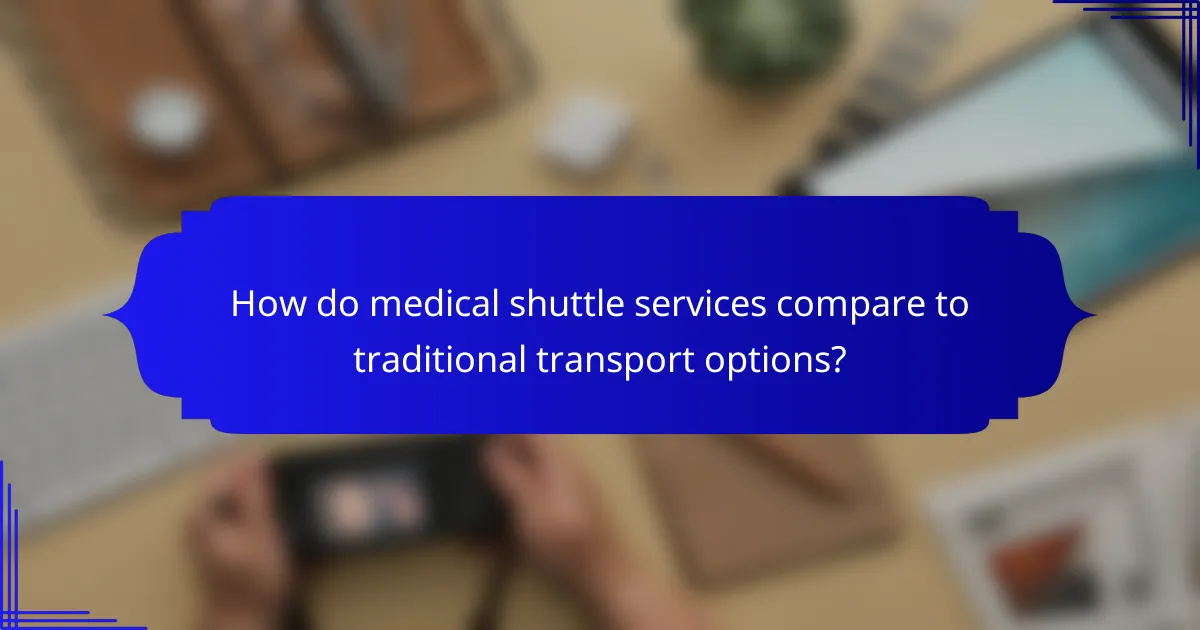
How do medical shuttle services compare to traditional transport options?
Medical shuttle services offer specialized transportation for patients, focusing on healthcare-related needs, while traditional transport options like taxis or public transit cater to general travel. This specialization often results in a more accommodating and efficient experience for patients requiring medical appointments or treatments.
Benefits of using medical shuttles over taxis
Medical shuttles provide several advantages over taxis, particularly for patients with specific health needs. These services are often equipped to handle mobility issues, offering features like wheelchair accessibility and trained staff to assist passengers during transit.
Additionally, medical shuttles typically have a better understanding of healthcare facilities and appointment schedules, ensuring timely arrivals. This contrasts with taxis, which may not prioritize medical appointments and could lead to delays.
Cost comparison with public transport
While public transport is generally more affordable, medical shuttles may offer a more tailored service that justifies their higher costs. For example, a medical shuttle ride might range from $20 to $50 depending on the distance and specific services provided, whereas public transport fares are often just a few dollars.
However, many insurance plans may cover the costs of medical shuttles, making them a viable option for patients who qualify. It’s essential to check with your insurance provider to understand coverage details and potential out-of-pocket expenses.
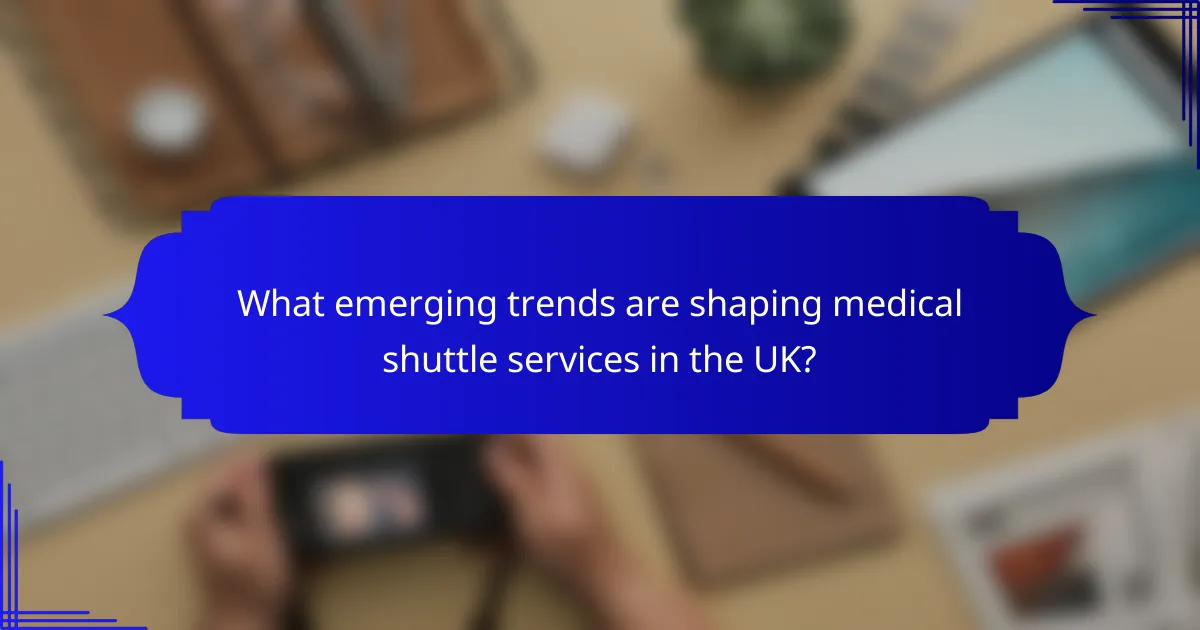
What emerging trends are shaping medical shuttle services in the UK?
Emerging trends in medical shuttle services in the UK are primarily driven by technological advancements and increased collaborations with healthcare providers. These developments aim to enhance patient accessibility, streamline operations, and improve overall service quality.
Technological advancements in booking systems
Technological advancements are revolutionizing how patients book medical shuttle services. Many companies now offer user-friendly mobile apps and online platforms that allow patients to schedule rides easily, track vehicles in real-time, and receive notifications about their appointments.
These systems often integrate with electronic health records (EHR), enabling seamless communication between healthcare providers and shuttle services. This integration can reduce wait times and ensure that patients arrive at their appointments punctually.
Increased partnerships with healthcare providers
There is a growing trend of medical shuttle services forming partnerships with healthcare providers, which enhances service delivery. These collaborations can lead to bundled services, where transportation is included as part of a patient’s care plan, making it easier for patients to access necessary treatments.
Such partnerships also allow for better coordination of care, as shuttle services can receive real-time updates about patient needs and appointment changes. This ensures that transportation aligns closely with healthcare schedules, improving patient satisfaction and adherence to treatment plans.
